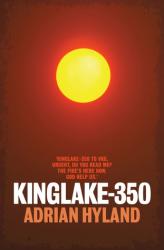
On 7 February 2009 Sergeant Roger Wood found himself at the epicentre of the worst bushfire disaster in Australia's history. Black Saturday.
Wood, who's a country cop with twenty years experience—and also a raucous, meditating, horse-riding vegan—was the only officer on duty in the small community of Kinglake. As the firestorm approached he was called out to numerous incidents including multi-fatality car accidents. He led a group of fifty people from a store west of Kinglake four kilometres to safety through burning bush. Minutes before it was completely destroyed.
Then, as the fire raged around him, he phoned his family ten kilometres away to warn them what was coming. When his wife answered, she screamed that the fire had already hit their property. Then the line went dead.
Black Saturday was a many-headed monster in whose wake stories of grief, heroism and desolation erupted all over the state of Victoria. This book is about the monster—and the heroism of those who confronted it.
Kinglake-350, Adrian Hyland
In 2008 we decided to move - away from the most fire-prone area on the immediate outskirts of Melbourne - to somewhere where we had more room to move, and co-incidentally where we would feel safer. The possibility of catastrophic fire events had weighed heavily on our minds - as the countryside dried and dried after many years of a devastating drought, and as people moved more and more into places that, frankly, looked like death traps. We're not real old bushies, but we both are country born or raised, and it wasn't hard to see what would happen... somewhere in Victoria... soon. And so it was that on Black Saturday 2009 we sat, in a slightly less dangerous place, forewarned by increasingly dire forecasts and portents, listening to the police scanners and radio reports, walking the boundaries of our own property, sniffing the air for smoke and scanning the sky for plumes, and knowing that hell had broken loose.
In the aftermath of that day, as we watched the Royal Commission unfold, and listened to the stories from the area, we'd hoped that maybe some plain talking would eventuate. That the Commission would, against all the odds, give everybody a genuine understanding of what went wrong for some people, but more importantly what worked for many others. It didn't even go close. It went down the path that we'd hoped like hell it would avoid, but knew deep down inside it would rush down. The blame game. With very little in the way of why or real, genuine information that anybody living in the bush could take away with them ... an insight into the day, it came out with a set of recommendations that we've heard before. No insight, no guidance, no clues.
Instead, KINGLAKE-350 does what we'd hoped for and more. Of course, I knew that if Hyland was writing a book it would be done with aplomb, sensitivity and considerable thought and compassion. I did, however, avoid reading the book for quite a while. I'm not sure why - maybe despite my expectations I wasn't sure I could take another disappointment on a matter of such vital importance, on another level I suppose I was worried about an overly emotional rollercoaster.
KINGLAKE-350 isn't an unbearable emotional rollercoaster. Sure there are moments where things get fraught, where the stories being told are hard to read about - but Hyland balances that beautifully with scientific information and background. Just as things seem to be getting perhaps just a little too much for the reader, he sensitively and elegantly pulls you somewhere else, takes you away from the all consuming too muchness of the events into explanation or information. All of which leaves me in awe of what Hyland must have heard, seen and knows about. What he must have left out.
Hyland also takes the opportunity to raise vital points about Australian's and their relationship with their natural environment. It provides a gentle, but very pointed reminder that allegedly being safe in the cities (on that day there was the distinct possibility that they would have to evacuate the centre of Bendigo - another fire looked like it could lob into the suburbs of Melbourne), that pretending that we don't live in a hostile environment, that continuing with so little real and genuine knowledge about our relationship with the bush, and the bush's requirements to survive is not just unsustainable - it's insanity. It reminds all of us that there are basic basic basic elements to our joint survival - and that the joint survival of the bush and the people who live in, near or within ember flight distance of it requires observation, consideration, care, planning and accommodation. It can't be learnt sitting in air-conditioned comfort watching a screen - but learn it we absolutely must. We're in mandatory reading territory here.